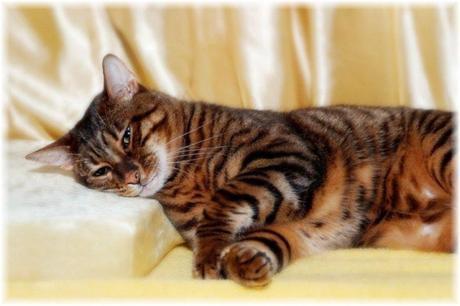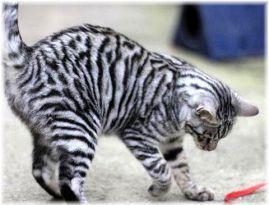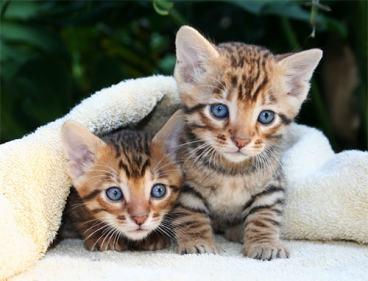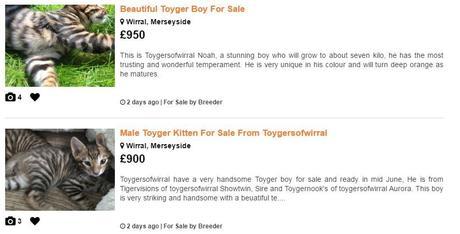This new domestic cat breed, the Toyger, began development by Judy Sugden in the late 1980's. Her goal was to create a domestic cat breed that closely resembled the wild Tiger and therefore would inspire people to save what is left of the species.

How much do Toyger cats cost?
Toygers remain a relatively new and constantly changing cat breed and as a result, true breed standards and information are still in the works. However, the following information will provide an overview of this developing domestic cat breed and hopefully provide some inspiration to help conserve the wild Tiger, as well.
What is a Toyger cat?

The name "Toyger" was created to describe the new domestic cat breed that Judy Sugden had in mind. She desired a house cat that would closely resemble the physical appearance of a wild Tiger (in other words, she wanted a "toy" tiger). Thus, the name Toyger was born!
Toygers were carefully developed by cross breeding a common domestic shorthair with stripes with a Bengal. Over time, Judy and her team imported other cats and cross bred them to help enhance certain physical qualities such as the specific tiger stripe pattern, the color, the circular head markings as well as a calm, low key personality.
Toyger cats were finally accepted for registration by The International Cat Association (TICA) in 1993. In 2000, Toyger cats were classified as a new breed for exhibition. Finally, in 2007, Toyger cats were granted recognition as a championship domestic cat breed.
Appearance and color of toyger cats
One of the most important features of the Toyger cat is their long branching stripes. This pattern was very important to develop as these stripes are key to the domestic cat resembling a wild tiger.
Typical domestic short haired cats with stripes do not have the branching stripe pattern that wild Tigers (and Toygers) have. Toyger cats are not considered "wild" cats at all as they do not have any "wild" blood in them. They are 100% domestic house cats with a wild cat appearance.

Another important feature of the Toyger is their coat color. Due to the fact that Judy Sugden wanted these house cats to resemble a wild Tiger, the coat color had to be just right as well. That meant creating a house cat with not only branching stripes but also making sure that the colors were orange and black or brown so that they would be as close to that of the colors of a wild Tiger as possible. Their coats are thick and soft which could mean a little extra grooming effort by the owner.
You may also notice that the Toyger is a very muscular cat breed. This is likelya contribution from the strong and powerful body structure of the Bengal. Males typically are larger than the females. Male Toyger cats can weigh between 10 pounds and 15 pounds whereas female Toyger cats will typically weigh between 7 pounds and 10 pounds.
As previously mentioned, owners of a Toyger may need to put in some extra effort when it comes to grooming their Tiger-like feline. While they are a short-haired cat breed, their fur is thick causing them to shed more frequently, especially during the warm months of the year. Therefore, brushing can be done on a weekly basis but should be done a few times each week during the warmer months.
Health and longevity
When it comes to the health and well-being of a Toyger cat, we may not have all of the information just yet. Being a relatively new domestic cat breed, their potential health conditions are still being discovered. Currently, the Toyger cat breed seems to be relatively healthy. However, there have been reported cases of Toyger cats being diagnosed with:
- Rolled Rib: A "rolled rib" is really just a fancy way to say "fractured" or "broken" rib. This type of injury is typically not very common unless a feline has been hit by a car. Therefore, Toygers should be able to avoid such an injury if they are indoor house cats 100% of the time.
- Feline Infectious Peritonitis: This is a viral disease that mutates and invades certain white blood cells in the cat's body. This disease is incurable and is often fatal.
- Heart Murmurs: It is a rather common diagnosis among people, dogs, cats and various other mammals. Heart murmurs are abnormal sounds from the heart that are caused by the blood flow inside and it can occur for a variety of reasons. Treatment of this diagnosis would depend on the underlying cause.
- Flat Chest Cage: This diagnosis is also referred to as Flat Chested Kitten Syndrome as it is primarily seen in kittens. Flat Chested Kitten Syndrome is diagnosed when a kitten has a dorsoventral flattening of their rib cage. This is a common occurrence in the Bengal which is why Toygers may be prone to the disorder.
- Hypertrophic Cardiomyopathy: This is another very common diagnosis in felines of all ages. There has yet to be a definitive cause of Hypertrophic Cardiomyopathy, but some experts believe that genetics could play a role. This disease is described as a thickening of the ventricle walls of the heart.
With proper care, veterinary checkups and attention, the Toyger is expected to live as long as 13 years or more!
What to feed a Toyger cat

Toyger cats should be eating a high-protein diet. This could include a variety of high-quality and high-protein cat kibble as well as the occasional meaty treat. However, make sure that the meat is fully cooked, plain, and boneless before offering it to your feline. It is also important that the quantity of meaty snacks is kept to a minimum.
While Toyger cats do need a sufficient amount of protein, it should not be given to them in excess. Talk to your veterinarian about the specific protein needs of your particular Toyger. Toyger cats do not need a lot of carbohydrates in their diets. Therefore, make sure that the kibble that you choose is not loaded with carbohydrate fillers. You should also make sure that the salt content in their diet is incredibly low as salt can be dangerous for felines to consume.
Toyger cat price - how much do Toyger cats cost?
Taking into consideration that the Toyger cat is a relatively new domestic cat breed, their exotic appearance, and their rarity, they will likely be a very expensive cat breed to adopt. The cost of adopting a Toyger will depend on the breeder, the parents, the quality of the markings and the overall quality of the cat.
Typically, Toyger cats that are not classified as "high" quality or "show" quality will cost approximately $500. Whereas Toygers that are born "high" quality and are labeled as "show worthy" would likely cost nearly $3,000. Bare in mind that the prices of a particular Toyger cat could fall anywhere between these two estimates.

It is also important to keep in mind that these are just the adoption fees from the breeder. Some breeders will have their Toyger kittens spayed or neutered, vaccinated, dewormed, microchipped, as well as registered and documented. Any of these additions from the breeder will also factor into the overall price of adopting a Toyger.
However, the cost of owning a Toyger does not end with adoption fees. If any or all of the additions previously mentioned were not provided by the breeder then you may be required to have them done.
For example, spaying, neutering, deworming and registration are all aspects that could be required and would then add additional cost. Some breeders require a non-refundable holding fee once you have chosen a Toyger to adopt. These fees can be as high as $200 or more! If the Toyger is not bred locally then you may have to pay for shipping charges and these fees can be around $300.
Finally, you must factor in the cost of food, veterinary visits, toys, cat trees, scratching posts, and various other costs that come with owning a Toyger.
In the end, owning a Toyger can be a wild and exciting addition to your home and family. However, it is important to provide excellent care to your Toyger to make sure that he lives a long, happy, and healthy life!

